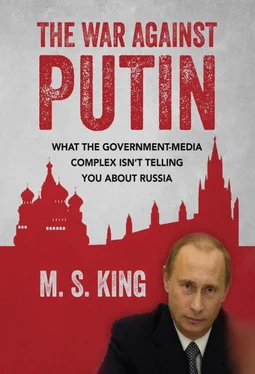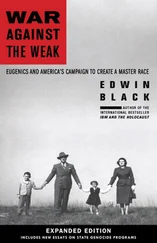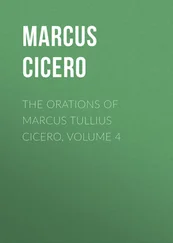On Christmas Day of 1991, Gorbachev resigned his position as he dissolved the Soviet Union into 15 sovereign Republics: Russia, Ukraine, Belarus, Georgia, Armenia, Latvia, Lithuania, Estonia, Moldova, Uzbekistan, Turkmenistan, Tajikistan, Kazakhstan, Kyrgyzstan and Azerbaijan.
Many of the weak and struggling nations of both Eastern Europe, and what was now the ex-Soviet Union, soon became easy pickings for the Globalists. The entrapment of the Western European nations within the Globalist European Union was already nearing completion. Now, the One Worlders were setting their sights on swallowing up the fresh meat of Eastern Europe, Central Asia, and even Russia itself. For astute observers who truly understood geo-politics, Bush himself “let the cat of the bag” in several addresses to the American public. Here is a sampling of actual Bush quotes, made publicly, from this period:
“Ultimately, our objective is to welcome the Soviet Union back into the world order. Perhaps the world order of the future will truly be a family of nations.” {29} 29 Search Term: Bush welcome Soviet Union back into the world order
“The world can therefore seize this opportunity to fulfill the long-held promise of a new world order — where brutality will go unrewarded, and aggression will meet collective resistance.” {30} 30 Search Term: Bush new world order where brutality unrewarded
“Out of these troubled times, our fifth objective — a new world order — can emerge.” {31} 31 Search Term: Bush out of these troubled times new world order can emerge
“What is at stake is more than one small country; it is a big idea — a new world order where diverse nations are drawn together in common cause.” {32} 32 Search Term: Bush it is big idea a new world order
Bush’s sidekick and Secretary of State James Baker (CFR) also spoke openly about the new world economic integration that was now within reach. Baker referred to it as “an architecture stretching from Vancouver to Vladivostok” . For the geographically challenged, Vancouver, Canada represents one of North America’s western most points and Vladivostok represents one of Russia’s eastern most points.
The American public had no idea what this “New World Order” business was all about. But if the reader has been paying attention, he or she should know by now what this ‘Great Game” is about.
The Eastern Bloc and the Soviet Union were gone with the wind. Now it was time for the badly weakened new Russian Republic, with its nukes and its vast resources, to be taken out and disintegrated.
Enter Bill Clinton and Boris Yeltsin.
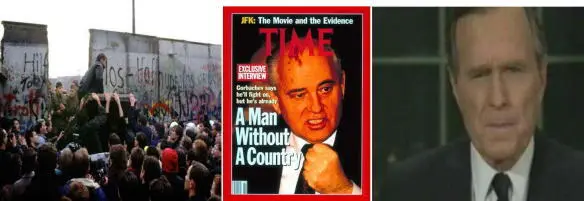
1: The Berlin Wall is no more. Gorbachev agreed to German reunification in exchange for a promise that NATO would not expand eastward. 2: Soon after dissolving the USSR, Gorby retired from politics. 3: Bush 41 spooked a lot of people with his repeated calls for a “New World Order” (advisors later told him to ditch the term).
CHAPTER 8
The Rape of Russia
Bush 41 and Gorbachev exited the world stage during the early 1990’s. Bush losing his 1992 reelection bid to fellow Yale alumnus and CFR member Bill Clinton; and Gorby yielding the reins of the new democratic Russia over to the inept drunkard, Boris Yeltsin.
Bill and Hillary Clinton rode into office on the back of a massive media propaganda push. The themes were “Hope” and “Change”; mantras repeated over and over again. Behind the empty platitudes, at least in the realm of foreign affairs, was the same old Globalist effort to destroy Russia. During his nomination speech at the 1992 Democrat Convention, Clinton paid homage to his Georgetown University mentor, Professor Carroll Quigley:
“As a teenager I heard John Kennedy’s summons to citizenship. And then, as a student at Georgetown, I heard that call clarified by a professor named Carroll Quigley…” {33} 33 Search Term: I heard that call clarified by a professor named Carroll Quigley
Days earlier, the Globalist Washington Post had also linked Clinton to Quigley:
“Throughout his (Clinton’s) career he has evoked [Quigley’s lectures] in speeches as the rhetorical foundation for his political philosophy.” {34} 34 Search Term: Washington Post Bill Clinton throughout career evoked Carroll Quigley
The significance of “Slick Willie’s” prime time shout out to one of his late idols was not lost on students of the Globalist movement. Back in 1966, Carroll Quigley, who had also taught at Princeton and Harvard, caused quite a stir in the “conspiracy theory” community when he published Tragedy and Hope , a heavy tome in which Quigley boasted of his connections to the ruling class while describing what their hidden plans for the world were.
Tragedy and Hope was written for the academic crowd, and was never intended to be the “whistle-blowing” expose which it soon became. You see, the idealistic Quigley openly supported the utopian concept of a New World Order ( the “Hope” in Tragedy and Hope ). Here are key excerpts from the work of Clinton’s academic guru:
“There does exist, and has existed for a generation, an international network which operates, to some extent, in the way the radical Right believes the Communists act…. I know of the operations of this network because I have studied it for twenty years and was permitted for two years, in the early 1960’s, to examine its papers and secret records. I have no aversion to it or to most of its aims and have, for much of my life, been close to it and to many of its instruments. I have objected… to a few of its policies… but in general my chief difference of opinion is that it wishes to remain unknown, and I believe its role in history is significant enough to be known.” (Chapter 65)
“The powers of financial capitalism had another far-reaching aim, nothing less than to create a world system of financial control in private hands able to dominate the political system of each country and the economy of the world as a whole . This system was to be controlled in a feudalist fashion by the central banks of the world acting in concert by secret agreements arrived at in frequent private meetings and conferences.” (Chapter 20) (emphasis added)
The loose-lipped Professor also revealed the fraud behind America’s “two Party system”. This is a good one!:
“The argument that the two parties should represent opposed ideals and policies, one, perhaps, of the Right and the other of the Left, is a foolish idea acceptable only to the doctrinaire and academic thinkers. Instead, the two parties should be almost identical, so that the American people can “throw the rascals out” at any election without leading to any profound or extreme shifts in policy.” {35} 35 Search Term: Carroll Quigley Tragedy and Hope Amazon
Clinton’s inner circle was filled with Globalist minded Rhodes Scholars and CFR members. Strobe Talbott, Clinton’s Deputy Secretary of State, was even more outspoken in his commitment to Globalism that Professor Quigley was. In a 1992 Op-Ed piece penned for Time Magazine, Talbott wrote:
“In the next century, nations as we know it will be obsolete; all states will recognize a single, global authority. National sovereignty wasn’t such a great idea after all.” {36} 36 Search Term: Strobe Talbott all states will recognize single global authority
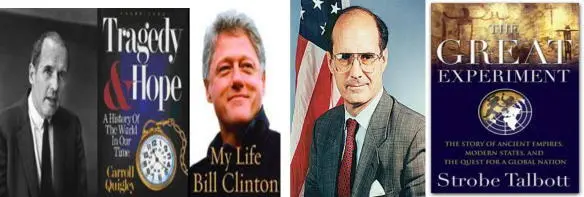
1: Globalist Quigley was one of Clinton’s mentors. 2 & 3: Clinton’s close friend Strobe Talbott doesn’t even try to hide his Utopian dream for a “Global Nation”.
With these Globalist credentials, it was not surprising that the Clinton team pursued “the agenda” as aggressively as any of his predecessors. In 1993, Clinton signed the North American Free Trade Agreement (NAFTA). Ostensibly a “free trade” agreement modeled after the old European Common Market, NAFTA, just like the ECM, was really intended to evolve into a regional super bloc of the Americas. It was to start with the US, Canada, and Mexico, and eventually expand into Central & South America. Concerned about the loss of economic & political sovereignty to “los Jankees”, opposition from Brazil, Argentina and Venezuela would, in later years, ultimately kill this grand scheme. {37} 37 Search Term: Brazil Argentina Venezuela defeat FTAA
Читать дальше
